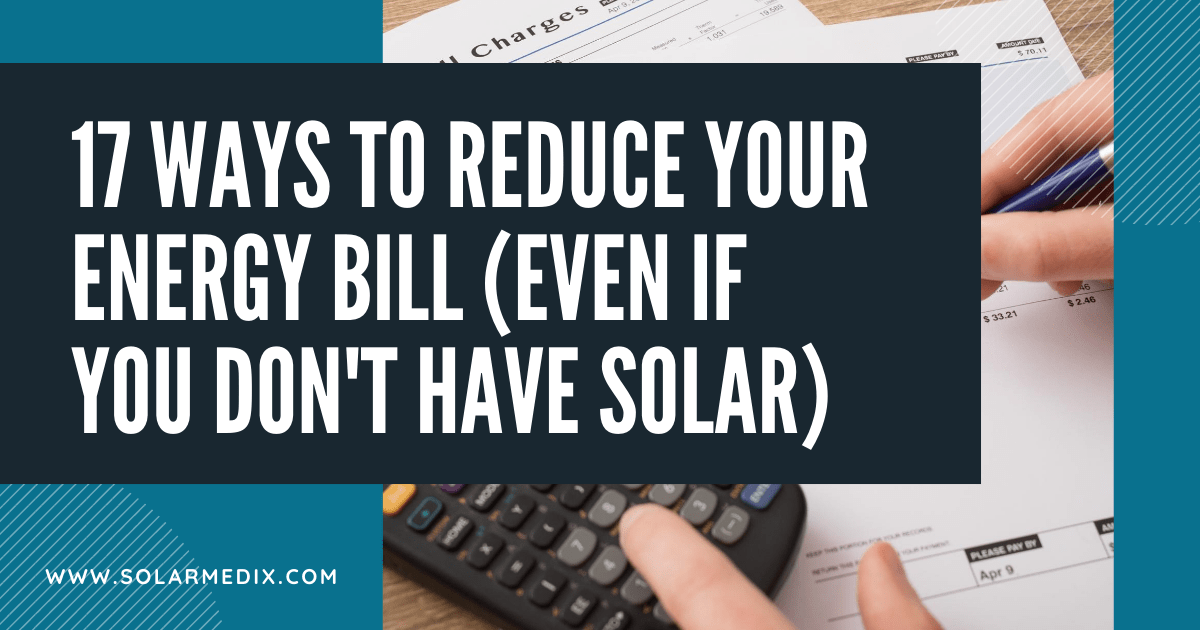Installing solar panels is one of the easiest ways to reduce your energy bill. However, even without solar panels, there are various tips and tricks in your home that can help you reduce your energy costs.
Here are some ways to reduce your energy bill each month:
Use Energy-Efficient Light Bulbs
If you use high-wattage light bulbs, you can replace them with ones that have a rating of as little as 2W. While this might not seem like much, the cumulative effect of replacing all of your current light bulbs with low-energy LED bulbs can save you a lot of money annually.
Use a Smart Meter to Monitor Your Power Usage
Knowledge is power, and this is especially true when it comes to electricity consumption. A smart meter will help you get information in real-time about how you are consuming your power. It will also help to identify appliances that are using a lot of energy when not in use.
Heat Water Off-Peak
If you use an electric water heater, use it at night during off-peak power rate times. In some locations, “time of use” rates information is available.
Replace Your Old Electronics
Running inefficient appliances can increase your power bills by hundreds of dollars. For instance, if you have an old fridge running in your garage, you should get rid of it. The same applies to that old television that heats up when you use it. Buy newer models that use a tenth of the power.
Upgrade Your Shower Heads
Modern showerheads use a fifth of the amount of water that’s used by old showerheads. These showerheads ensure that you use less water, which means you will need to heat less water for bathing.
Insulate Exposed Pipes
Any hot water pipes that are exposed are not only a danger but also cost you additional money on your power bill. Every part of the hot water pipes, including the pressure-relief valve of your hot water tank, should be insulated. When it is safe to do so, insulate the electrically heated storage tanks.
Check Your AC and Heaters
Your HVAC system should be inspected on a regular basis to ensure that it’s operating at optimal efficiency.
Inspect Ductwork
If your ductwork is degraded or poorly installed, it can cost you substantial energy losses. Over the years, these losses can increase your electricity costs by hundreds of dollars. Ensure that your heating ducts have not been damaged or clogged by any debris or small animals.
Seal Off Your Home
If you live in an older home with wall vents and chimneys, seal them off. These openings cause your energy bill to rise, especially if you use an electric HVAC system.
Replace Narrow-Beam Ceiling Lights
Most modern wide-beam LEDs can do the job of the narrow-beam halogen ceiling lights. They do not require as many holes to be cut into the ceiling, which creates fewer openings for heat to escape in the winter or enter in the summer.
Insulate Your Attic
If your home does not have roof insulation, you should consider installing some. All vertical surfaces in your attic should be insulated, and you should consider adding a layer of aluminum in the attic space as well. You can use thermal imaging to help you find potential gaps in sections of insulation that exist in your attic.
You can also consider using floor and wall insulation. Depending on the region where you live, this could be a great way to keep your home warmer while decreasing your power bills.
Cover Your Windows With Curtains
Using curtains or drapes adds an extra layer of insulation to your windows. They can help keep out the heat in the summer and prevent heat loss in the colder months. You can also use cheap thermal window treatments, such as plastic films or bubble wrap, to insulate your home.
Plant Trees Outside of Your Home
Planting trees is not just good for the environment. The areas surrounding the trees on your property will benefit from a cooling effect. These trees help keep the sun from entering your home directly, which helps lower your power bill.
Use Double Glazing on Your Windows
Double-glazing will help to add a pocket of air that keeps your home insulated, resulting in a lower energy bill. On top of that, double-glazed windows will also help to reduce any noise from outside.
Use a Pool Cover
A cover will help keep your pool water cooler during the summer while minimizing cleaning, chemical use, and how often you need to run your filter pump. You should also consider upgrading to a more efficient pump if your current one is over ten years old. Carefully monitor it to ensure that it does not run for more time than necessary every day.
Consider Using a Reverse Cycle Heat Pump
A reverse cycle heat pump should be your go-to option if you are replacing your HVAC system. With this system, heat is extracted from the outside air and pumped into your home to achieve the desired temperature. While the initial cost is higher, it will cut your HVAC bill by almost a third.
Reduce Heat in Your Laundry Machines
If you use a washer and dryer in your home, there are things that you can do to improve their efficiency. One way to do this is to wash your clothes on a colder setting. According to the Department of Energy, you could cut your energy use in half by switching from hot water to warm water.
There are special cold-water detergents that will ensure your clothes are just as clean. Besides that, you should try filling the machine as much as possible instead of doing small loads at a time. The reason for this is that the machine uses the same amount of energy for a full load as it does for a partial load with only minuscule differences.
There Are Many Ways to Reduce Your Energy Bill
Using these measures should help to lower your energy bill, and if you choose to add solar panels to your home in the future, you can expect to maximize your energy savings even further.













